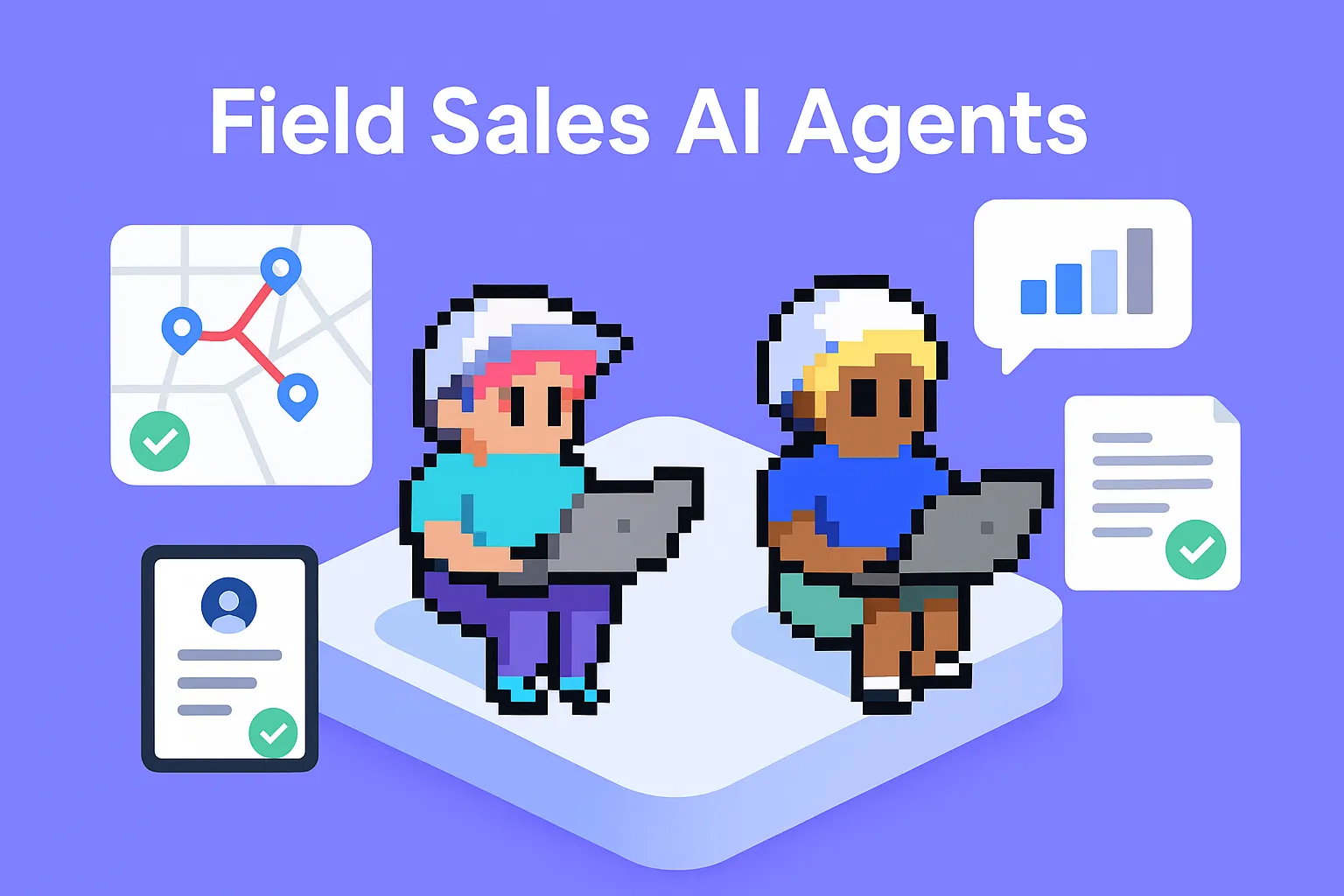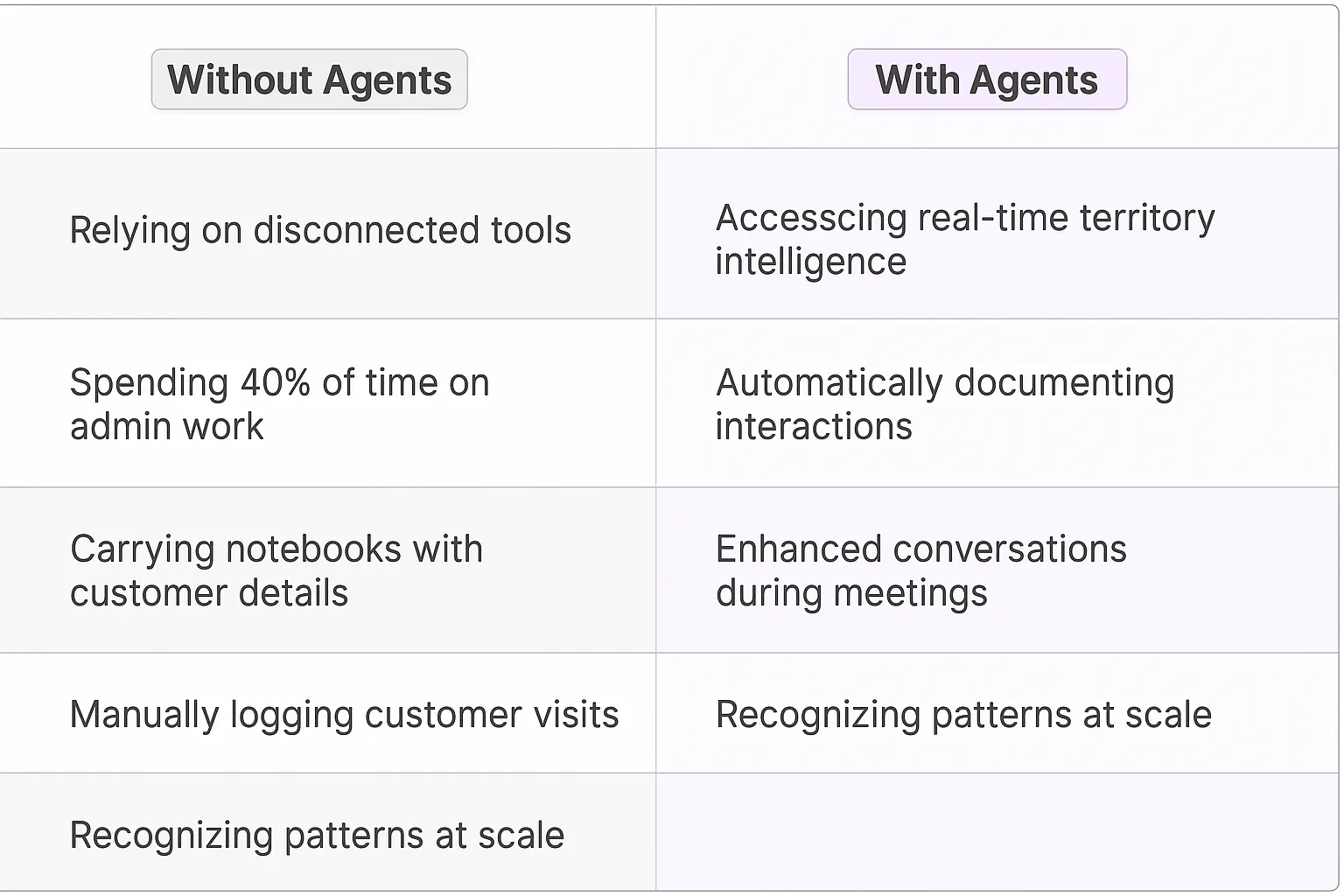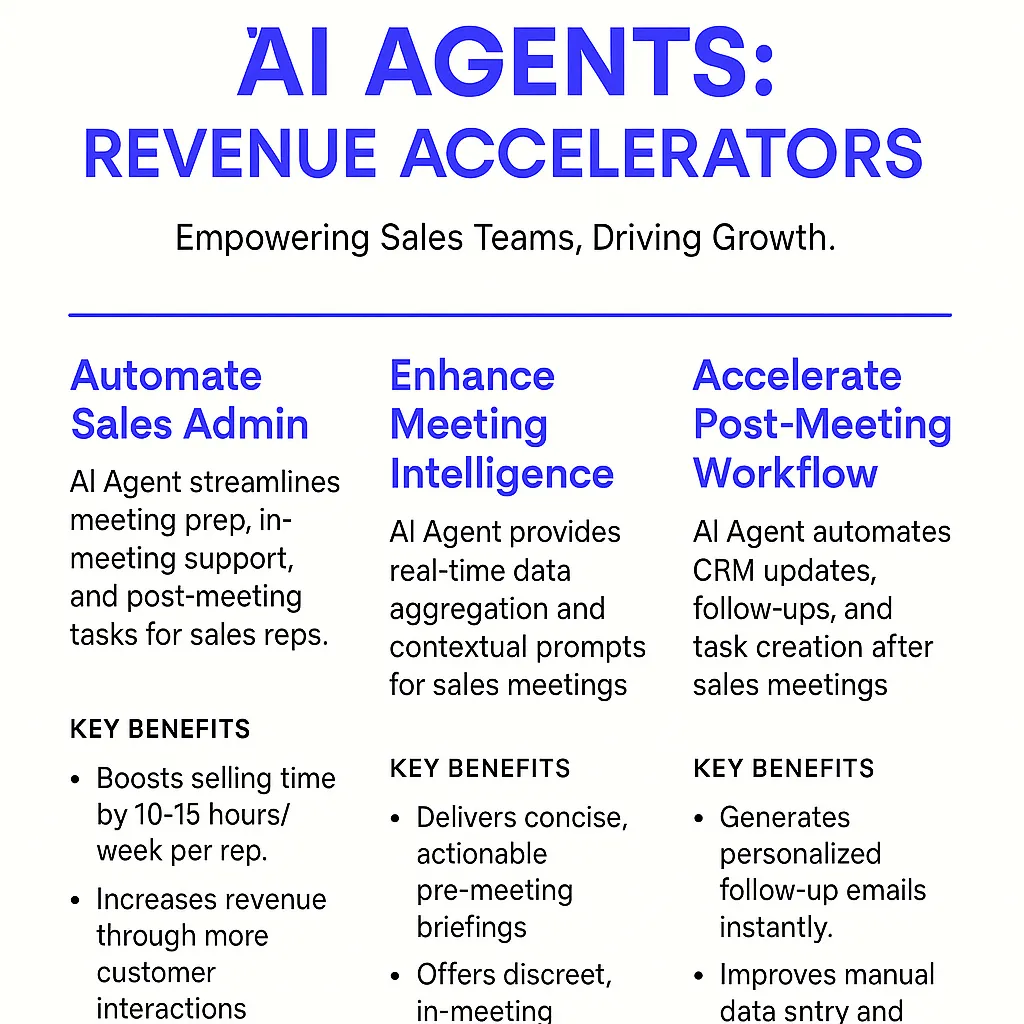Field sales representatives are the frontline warriors of business, meeting customers face-to-face and building relationships that drive revenue. They navigate complex territories, manage multiple accounts, and need to be experts in their products while maintaining deep customer knowledge. The role demands a unique blend of relationship building, technical knowledge, and strategic thinking.
The modern field sales representative operates with several core capabilities:- Territory management and route optimization- Real-time access to customer and product information- Meeting documentation and follow-up management- Performance tracking and analytics- Customer relationship management- Quote generation and order processingThese features become exponentially more powerful when enhanced by AI agents, creating a new paradigm in field sales effectiveness.

Field sales reps traditionally relied on a complex stack of disconnected tools - CRM data entry, manual route planning, spreadsheets for tracking conversations, and endless email threads. The cognitive load was intense. I've seen sales teams spend 40% of their time on admin work rather than building relationships with customers. They'd carry around notebooks filled with customer details, manually log visits, and struggle to surface key insights from past interactions.
The shift to AI-powered digital teammates fundamentally transforms how field sales works. These agents act as a force multiplier for sales reps in several critical ways:
The most profound impact comes from how these capabilities compound over time. Each interaction makes the AI smarter about your specific market dynamics and customer needs. Top performing reps are seeing 3-4x improvements in customer face time while maintaining higher quality engagement records.
This isn't just automation - it's augmentation of human capabilities. The best field sales reps are using AI agents to amplify their relationship-building skills rather than replace them. They're spending more time on strategic customer conversations while their digital teammates handle the cognitive heavy lifting of data synthesis and pattern recognition.

Field sales is undergoing a fundamental shift. The traditional model of a lone sales rep armed with printed catalogs and paper forms is giving way to a digitally-enhanced approach where AI agents act as force multipliers for human sales talent.
What's fascinating about this transformation is how it addresses the core inefficiencies in field sales. Sales reps typically spend 65% of their time on non-selling activities. AI agents flip this ratio by handling the administrative burden, letting reps focus on what they do best - building relationships and closing deals.
The most successful implementations pair AI capabilities with human expertise rather than trying to replace it. For example, while the AI agent handles meeting scheduling and follow-ups, the sales rep can focus on reading customer body language and picking up on subtle signals during negotiations.
This hybrid approach creates a powerful feedback loop: the AI agent learns from each interaction, continuously improving its ability to support the sales process, while the human rep gains deeper customer insights through the AI's data analysis.
The key to successful adoption is starting small with focused use cases that deliver immediate value. Begin with basic tasks like automated meeting notes and gradually expand to more complex processes like territory optimization. This allows sales teams to build trust in their digital teammates while maintaining their existing workflows.
Field sales organizations that embrace this approach are seeing 20-30% increases in productivity and significant improvements in customer satisfaction scores. The future belongs to sales teams that effectively combine human relationship skills with AI-powered capabilities.

Field sales representatives face unique challenges that AI agents are uniquely positioned to solve. These digital teammates integrate seamlessly into the daily rhythm of field sales, creating measurable impact across multiple sectors. The real-world applications range from pharmaceutical sales to industrial equipment distribution, where AI agents serve as force multipliers for sales teams on the ground.
What makes AI particularly effective in field sales is its ability to handle the complex web of tasks that traditionally pulled reps away from their core mission - building relationships and closing deals. From real-time competitor analysis to instant product spec lookups, these tools fundamentally transform how field teams operate in their territories.
The following industry examples demonstrate how AI agents tackle specific pain points and create tangible value for field sales organizations. Each case represents a tested implementation where AI has proven its worth in real-world sales environments.
Real estate field sales teams face a unique challenge - they need to be experts on hundreds of properties while managing complex client relationships and market dynamics. A Field Sales Representative AI Agent transforms how realtors operate in the field by functioning as their always-on digital teammate.
When a realtor is driving between properties, they can have natural voice conversations with their AI Agent to get instant property details, comparable sales data, and neighborhood insights. The agent processes MLS listings, tax records, school ratings, and crime statistics in real-time to surface relevant data points during client interactions.
The real power emerges during property showings. As the realtor walks through a home with clients, the AI Agent listens to the conversation and proactively suggests talking points about unique features, recent renovations, or market positioning. It can instantly calculate monthly payments, estimate utility costs, and even project potential rental income - all through natural dialogue.
Behind the scenes, the AI Agent handles follow-up communication by drafting personalized emails highlighting specific features that resonated with each buyer. It maintains detailed interaction logs and buying signals, helping realtors prioritize their hottest leads and time investment across their portfolio.
What's fascinating is how this creates a compounding knowledge advantage. Every showing, every client interaction, every closed deal makes the AI Agent smarter about that specific market. Top performing realtors are essentially building their own proprietary market intelligence system that gets more valuable over time.
The end result? Realtors spend more time building genuine relationships and less time buried in spreadsheets and property details. Their AI teammate handles the cognitive heavy lifting, letting them focus on the human elements that truly close deals.
The pharmaceutical sales landscape is incredibly complex - medical reps need deep scientific knowledge, regulatory compliance awareness, and the ability to engage meaningfully with busy healthcare professionals. A Field Sales Representative AI Agent fundamentally changes this dynamic by becoming a real-time knowledge partner for pharma reps.
During physician visits, the AI Agent actively listens to conversations and provides contextual prompts about clinical studies, drug interactions, and patient outcomes. When a doctor raises specific concerns about a medication, the AI instantly surfaces relevant peer-reviewed research and real-world evidence, enabling reps to have more substantive scientific discussions.
The AI Agent's ability to process massive amounts of medical literature and clinical data creates fascinating second-order effects. It can identify patterns in physician prescribing behaviors, track competing drugs' market penetration, and suggest optimal timing for follow-up engagement based on practice specialties and patient populations.
Between visits, the AI Agent transforms how reps prepare and follow up. It analyzes previous interaction notes to surface relevant talking points, flags changes in prescribing patterns, and drafts personalized communications that align with each physician's clinical interests and patient needs. The system even monitors medical journals and conferences to alert reps about new research relevant to their key accounts.
Most interestingly, this creates a network effect within pharma sales teams. As more reps interact with their AI teammates, the system builds a deeper understanding of successful engagement strategies across different physician specialties and practice types. High-performing reps essentially create a knowledge flywheel that elevates the entire team's effectiveness.
The impact extends beyond just sales numbers. By handling the complex information management aspects, the AI Agent lets reps focus on building authentic relationships with healthcare providers and better understanding patient needs - ultimately leading to more informed prescribing decisions and better health outcomes.
Building effective Field Sales Representative AI agents requires navigating several complex technical hurdles. The integration with existing CRM systems often presents compatibility issues, especially with legacy platforms that weren't designed for AI interaction. Mobile connectivity poses another significant challenge - field sales teams frequently operate in areas with spotty internet coverage, requiring robust offline capabilities and seamless data synchronization.
Data privacy becomes particularly thorny when AI agents handle sensitive customer information across different jurisdictions. Sales teams crossing state or national borders need AI systems that automatically adjust to varying compliance requirements while maintaining consistent performance.
The human element presents unique operational complexities. Sales veterans who've built careers on relationship-building may resist AI tools, viewing them as threats rather than enablers. Creating buy-in requires demonstrating clear value while preserving the authentic human connections that drive sales success.
Training these AI agents demands extensive real-world sales conversation data, which many organizations lack. The AI needs to understand industry-specific terminology, regional dialects, and cultural nuances - a particularly difficult task for companies operating across diverse markets.
Merging AI agents into existing sales workflows requires careful orchestration. Sales teams need seamless handoffs between AI and human team members, especially for complex deals requiring nuanced negotiation. The AI must know when to step back and let human expertise take over.
Performance measurement presents another challenge - traditional sales metrics may not capture the full impact of AI support. Organizations need new frameworks to evaluate how AI agents influence deal velocity, customer satisfaction, and long-term relationship building.
As field sales teams grow, maintaining AI performance at scale becomes crucial. The system needs to handle increasing data volumes while delivering consistent response times. Resource allocation between AI processing and mobile device limitations requires careful balance, especially in regions with infrastructure constraints.
Cost management also becomes more complex at scale. Organizations must weigh the investment in AI infrastructure against the expected productivity gains, considering factors like training costs, ongoing maintenance, and the need for specialized technical support.
The integration of AI agents into field sales represents a fundamental shift in how sales teams operate. By offloading cognitive tasks to digital teammates, sales professionals can focus on what they do best - building relationships and closing deals. The most successful organizations will be those that effectively blend human expertise with AI capabilities, creating a compound effect that drives exponential improvements in sales performance. As these systems continue to evolve, we'll see even more sophisticated applications that further enhance the field sales process while maintaining the critical human element that drives successful sales relationships.